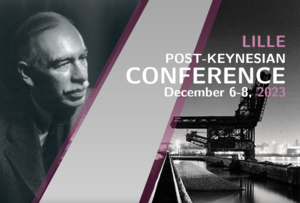Economic possibilities for our grandchildren...90 years later
Premier colloque Postkeynésien de Lille

Un colloque organisé par le Clersé (Centre lillois d'études et de recherches sociologiques et économiques), l'Université de Lille et l'ADEK (Association pour le Développement des Études Keynésiennes)
In 1930, John Maynard Keynes wrote his famous essay where he tried to anticipate the economic situation that would prevail 100 years later. More 90 years ahead, two questions can be addressed: i) how has the economy evolved since the 1930s; ii) how do Keynes' grandchildren now imagine the economy for their own grandchildren? The conference welcomes papers dealing with these two questions.
Initially, the conference was planned to take place in december 2020, but then, the pandemic hit our lives and forced us to postpone our event. Nonetheless, we decide to keep the main theme for our conference, since the COVID crisis and its lockdowns led us to reconsider the world we live in and to imagine what could be the world after. When Keynes wrote the Economic Possibilities, the economy was in the middle of one of the most severe economic crisis the World has ever experienced. The economic mood was very pessimistic at the time, but Keynes tried to see beyond the short-period crash and look at the long-run future of our society. He assessed that the economic problem would be solved, or nearly so, within about 100 years. There are less 10 years left now, and the problem of "poverty in the midst of plenty" is still relevant today. After several decades of rising inequalities, a new economic and financial crisis has casted doubt on the limits of conventional economic policies, especially monetary policy. Meanwhile, some issues have emerged that challenge the economic problem, especially the "ecological problem". Why aren't we where Keynes thought we would be? The conference encourages proposals which are dedicated to explain why we are so far apart from the picture Keynes drew in 1930. The conference will also try to anticipate the economic future of our own grandchildren. How can we anticipate the economic situation at the end of the XXIst century? Are we able to promote economic policies dealing with the ecological problem? What are the monetary and financial reforms needed to shape a more stable economic environment?
We encourage economists from various strands of Post-Keynesian economics, as well as from other heterodox traditions, to submit papers that fall within the scope of the general theme of the Conference, as well as within the scope of Post-Keynesian economics. Fully organized sessions are also welcomed. Do not hesitate to contact the organizers if you plan to submit a full session. As 2020 was also the 50th anniversary of the death of Michal Kalecki, papers that honour his memory are also welcomed.
The working language for the conference will be English. Some parallel sessions in French will be held.
